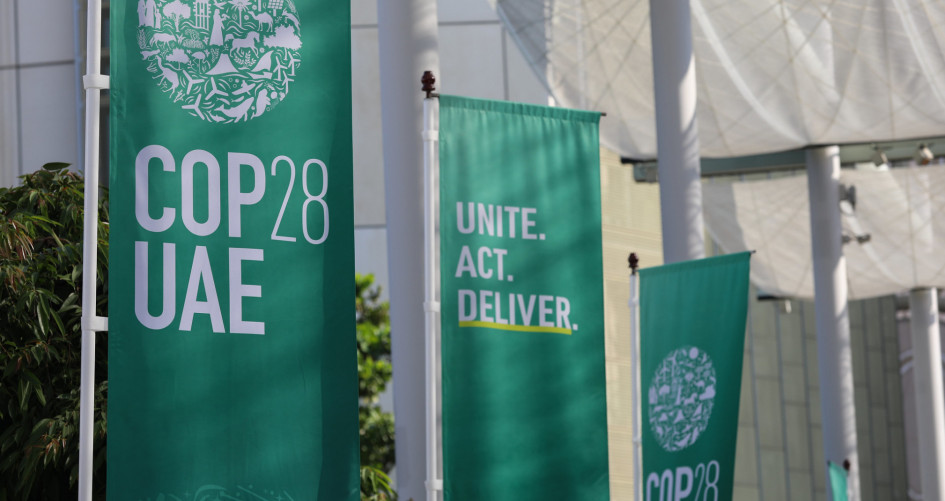Events
At COP28, the Regional Collaboration Centre for Asia and the Pacific (RCC AP) hosted an event on 'Informing more ambitious NDCs in 2025: Outcome of Global Stocktake', to share practices and experiences on benefits, gaps, and constraints in developing and implementing Nationally Determined Contributions (NDCs) in a build up to the next revision cycle in 2025. The event brought together a diverse group of speakers, including:
- the NDC Partnership, to outline the path to 2025 NDCs;
- the African Development Bank to highlight the role of climate finance in NDC implementation,
- Directors of the Climate Departments from Colombia and Thailand to reflect on challenges and opportunities ahead of 2025 NDC;
- the Grantham Research Institute on Climate Change and the Environment on the outlook ahead to 2025 and recommendations.
The event produced a rich dialogue on the 2025 NDCs, with a lively discussion including active participation from the audience in the Q&A session.
RCC AP also helped deliver the event on 'Nationally Determined Contributions in 2025 – Shaping the next round of NDCs' at COP28. This event brought together a diverse group of stakeholders, including country representatives from Brazil, Indonesia and Tunisia, as well as representatives of development agencies such as UNDP, the NDC Partnership and the UN Climate Change Regional Collaboration Centres.
The event highlighted that while looking at the previous and upcoming NDCs, ambition and implementation is a simultaneous process, NDCs need to be action oriented, with economy-wide targets and that the NDC update is an opportunity to boost climate investment. One of the key messages from the event is that we need to flip our approach and think locally, while acting globally. This means that we need to move from a top-down approach to a bottom-up approach, where we start the planning of policies like NDCs through a national lens, driven by country priorities and national circumstances, translating to actions being implemented regionally and globally.
Indonesia hosted a discussion on the ASEAN Joint Statement on Climate Change, emphasizing the need for stronger 2030 NDC targets and developed country support. Minister Siti Nurbaya Bakar led the drafting and called for timely, sustainable, and gender-inclusive financial and technical assistance. RCC AP Regional Lead, Julie Amoroso-Garbin, commended Indonesia's leadership and reaffirmed RCC AP’s support to accelerate climate commitments in the region.
Partners and Collaborations
RCC AP reinforced its collaboration with regional partners in the Asia-Pacific, with the signing of Memorandums of Understanding between UN Climate Change and UN ESCAP as well as IGES: these will enable continuing to strengthen support provided to countries in the region in tackling climate change on the ground, via RCC AP. As IGES is our hosting partner in Bangkok, Thailand, and ESCAP is the biggest intergovernmental platform in the Asia-Pacific, renewing our Memorandums of Understanding reaffirmed our shared commitment to deliver impactful climate action in the region.
Furthermore, RCC AP and the Secretariat of the Pacific Regional Environment Programme (SPREP) took the opportunity of COP28 to meet and discuss collaboration areas in the context of support for the Pacific Small Islands and Developing States (SIDS). Needs of the Pacific SIDS were identified, such as capacity-building for countries, the need to enable stakeholders to convene, network, collaborate, and knowledge exchange -with a strong focus on the role of traditional knowledge in tackling the climate crisis.
Outcomes and Remarks
The outcomes of COP28 and the global stocktake include additional work for the RCCs: we are delighted to see the official recognition of the regional collaboration centres as six UN Climate Change arms on the ground to support the implementation of the Paris Agreement at the regional level. It is in the RCCs' mission to increase accessibility to information and know-how, and concretely contribute to leave no-one behind.
Finally, our Executive Secretary, Simon Stiell, was very clear as he spoke at the closing plenary of the COP, when he vowed that "at UN Climate Change, we will keep working to improve the process and help Parties go further, faster and fairer." He then called for a full budget to be allocated to the secretariat and therefore to its six regional collaboration centres, to deliver on the multitude of mandated processes and workstreams. These mandates are right, and we indeed need to deliver on them further, faster and in a fairer way.

